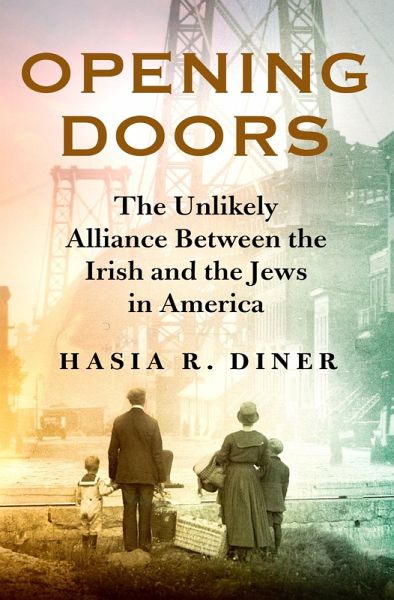
Opening Doors (eBook, ePUB)
The Unlikely Alliance Between the Irish and the Jews in America
Versandkostenfrei!
Sofort per Download lieferbar
11,95 €
inkl. MwSt.
Weitere Ausgaben:

PAYBACK Punkte
6 °P sammeln!
The extraordinary untold story of how Irish and Jewish immigrants worked together to secure legitimacy in America.Popular belief holds that the various ethnic groups that emigrated to the United States at the turn of the twentieth century regarded one another with open hostility, fiercely competing for limited resources and even coming to blows in the crowded neighborhoods of major cities. One of the most enduring stereotypes is that of rabidly anti-Semitic Irish Catholics, like Father Charles Coughlin of Boston and the sensationalized Gangs of New York trope of Irish street thugs attacking de...
The extraordinary untold story of how Irish and Jewish immigrants worked together to secure legitimacy in America.
Popular belief holds that the various ethnic groups that emigrated to the United States at the turn of the twentieth century regarded one another with open hostility, fiercely competing for limited resources and even coming to blows in the crowded neighborhoods of major cities. One of the most enduring stereotypes is that of rabidly anti-Semitic Irish Catholics, like Father Charles Coughlin of Boston and the sensationalized Gangs of New York trope of Irish street thugs attacking defenseless Jewish immigrants.
In Opening Doors, Hasia R. Diner, one of the world's preeminent historians of immigration, tells a very different story; far from confrontational, the prevailing relationships between Jewish and Irish Americans were overwhelmingly cooperative, and the two groups were dependent upon one another to secure stable and upwardly mobile lives in their new home. The Irish had emigrated to American cities en masse a generation before the first major wave of Jewish immigrants arrived, and had already entrenched themselves in positions of influence in urban governments, public education, and the labor movement. Jewish newcomers recognized the value of aligning themselves with another group of religious outsiders who were able to stand up and demand rights and respect despite widespread discrimination from the Protestant establishment, and the Irish realized that they could protect their political influence by mentoring their new neighbors in the intricacies of American life.
Opening Doors draws from a deep well of historical sources to show how Irish and Jewish Americans became steadfast allies in classrooms, picket lines, and political machines, and ultimately helped one another become key power players in shaping America's future. In the wake of rising anti-Semitism and xenophobia today, this informative and accessible work offers an inspiring look at a time when two very different groups were able to find common ground and work together to overcome bigotry, gain representation, and move the country in a more inclusive direction.
Popular belief holds that the various ethnic groups that emigrated to the United States at the turn of the twentieth century regarded one another with open hostility, fiercely competing for limited resources and even coming to blows in the crowded neighborhoods of major cities. One of the most enduring stereotypes is that of rabidly anti-Semitic Irish Catholics, like Father Charles Coughlin of Boston and the sensationalized Gangs of New York trope of Irish street thugs attacking defenseless Jewish immigrants.
In Opening Doors, Hasia R. Diner, one of the world's preeminent historians of immigration, tells a very different story; far from confrontational, the prevailing relationships between Jewish and Irish Americans were overwhelmingly cooperative, and the two groups were dependent upon one another to secure stable and upwardly mobile lives in their new home. The Irish had emigrated to American cities en masse a generation before the first major wave of Jewish immigrants arrived, and had already entrenched themselves in positions of influence in urban governments, public education, and the labor movement. Jewish newcomers recognized the value of aligning themselves with another group of religious outsiders who were able to stand up and demand rights and respect despite widespread discrimination from the Protestant establishment, and the Irish realized that they could protect their political influence by mentoring their new neighbors in the intricacies of American life.
Opening Doors draws from a deep well of historical sources to show how Irish and Jewish Americans became steadfast allies in classrooms, picket lines, and political machines, and ultimately helped one another become key power players in shaping America's future. In the wake of rising anti-Semitism and xenophobia today, this informative and accessible work offers an inspiring look at a time when two very different groups were able to find common ground and work together to overcome bigotry, gain representation, and move the country in a more inclusive direction.
Dieser Download kann aus rechtlichen Gründen nur mit Rechnungsadresse in D ausgeliefert werden.













